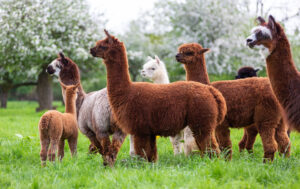
People around the globe call alpacas “the world’s finest livestock.” There are many reasons to raise alpacas: they make great pets, are good with kids, and can make a farm profit. Plus, they are gentle on the landscape and easy to raise!
Tending to a herd of alpacas can be an exciting source of revenue and a rewarding lifestyle. Here are a few things to consider before you begin your journey of raising these fluffy graceful creatures.
Shelter
Alpacas need shelter from harsh elements. They will mostly need wind protection in moderate climates without harsh winters. In nature, alpacas love to have a grove of trees to gather in for protection. A 3-sided shelter is usually more than enough for their needs.
Manure Management
The alpacas will create new manure daily and should be removed from their living area regularly to minimize the risk of parasites. Have a plan for the disposal of your manure. It may be a stockpile you spread on your pastures and fields or selling it to gardeners or nurseries.
Sheering
Alpaca fiber is considered extremely high quality and is growing in demand. Alpacas produce about 10 lbs. of fleece each year. Bag it according to the quality, and you can sell it for a premium. Many alpaca owners will also use the wool to create additional products, including yarn or clothing. Alpaca wool is stronger, warmer, and softer than sheep’s wool at the same weight!
Before shearing, make sure to groom the alpaca fleece first. Brush it and pick out any burs and twigs, so the wool is clean. Alpaca fiber doesn’t have lanolin like sheep’s wool, so it doesn’t need the intense cleaning sheep’s wool needs. The shearing event is something you may hold on your farm, or you may take your animals to another location for shearing.
Fencing
Alpacas are one of the easiest animals to keep fenced in. They honor fence lines and won’t try to push against them or get out like other livestock, but alpacas aren’t that great at defending themselves. So the fencing options you choose should account for the types of local predators likely to prey on your animals.
Food and Nutrition
Alpacas do not do well on grain-based foods. Do not feed alpacas bread, horse or pig nuts, or basic grains of any kind. Grains can cause ulcers and severe health issues in alpacas.
They are gentle grazers, only eating the very tops of plants, so they aren’t considered good “mowing” animals. They are very gentle on the landscape, easy on vegetation, and love to eat grass, herbs, leaves, and shrubs.
Herd Health
Alpacas need to have their toenails cut regularly. In some areas, they will need routine immunizations. Teeth trimming may be required, and assistance with birthing may be necessary. The ability to weigh alpacas is important in managing their health. Having an area where a scale and restraining chute can be set up is important.
Climate
Alpacas are adaptable to nearly any climate but may need extra care in extreme weather. Both extreme heat and cold can cause concern for alpacas, although alpacas do better in cold weather than in hot weather. If you live in a hotter or southern location, you must ensure they have a shady place to cool down.
At Deer Creek Structures, our custom alpaca sheds provide comfortable shelter for your furry pack members. Alpacas require protection from harsh elements to thrive in their environment, and we have the tools and resources to build them the perfect safe zone.
Contact us at (254)546-2276 to request a quote and learn more about our services today!
